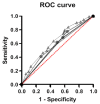Vasovagal Syncope Is Associated with Variants in Genes Involved in Neurohumoral Signaling Pathways
- PMID: 36140820
- PMCID: PMC9498630
- DOI: 10.3390/genes13091653
Vasovagal Syncope Is Associated with Variants in Genes Involved in Neurohumoral Signaling Pathways
Abstract
Vasovagal syncope (VVS) is the most common cause of sudden loss of consciousness. VVS results from cerebral hypoperfusion, due to abnormal autonomic control of blood circulation, leading to arterial hypotension. It is a complex disease, and its development is largely associated with genetic susceptibility. Since abnormal neurohumoral regulation plays an important role in VVS development, we analyzed the association of VVS with polymorphic variants of ADRA1A, ADRB1, HTR1A, ADORA2A, COMT, and NOS3 genes, the products of which are involved in neurohumoral signaling, in patients with a confirmed VVS diagnosis (157 subjects) and individuals without a history of syncope (161 subjects). We were able to identify the associations between VVS and alleles/genotypes ADRA1A rs1048101, ADRB1 rs1801253, ADORA2A rs5751876, and COMT rs4680, as well as NOS3 rs2070744 in biallelic combination with COMT rs4680. Thus, we are the first to observe, within a single study, the role of the genes that encode α- and β-adrenergic receptors, catechol-O-methyltransferase, adenosine receptors and nitric oxide synthase in VVS development. These findings demonstrate that the genes involved in neurohumoral signaling pathways contribute to the formation of a genetic susceptibility to VVS.
Keywords: genetic polymorphism; genetic predisposition; signal transduction; syncope; vasovagal syncope.
Conflict of interest statement
The authors declare no conflict of interest.
Figures


References
-
- Brignole M., Moya A., De Lange F.J., Deharo J.-C., Elliott P.M., Fanciulli A., Fedorowski A., Furlan R., Kenny R.A., Martínez A.M., et al. Practical Instructions for the 2018 ESC Guidelines for the diagnosis and management of syncope. Eur. Heart J. 2018;39:e43–e80. doi: 10.1093/eurheartj/ehy071. - DOI - PubMed
-
- Pevzner A.V., Kuchinskaya E.A., Kiktev V.G., Kheimets G.I. Treatment of Vasovagal Syncope Associated with Asystole: Literature Review and Case Report of Long-term Follow-up. Ration. Pharmacother. Cardiol. 2021;17:315–322. doi: 10.20996/1819-6446-2021-04-09. - DOI
Publication types
MeSH terms
Substances
LinkOut - more resources
Full Text Sources
Miscellaneous

